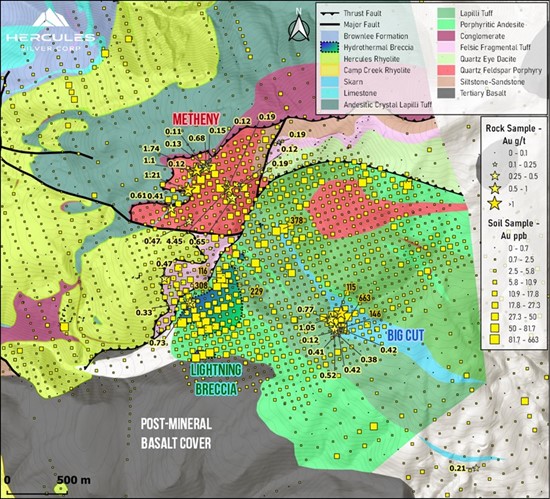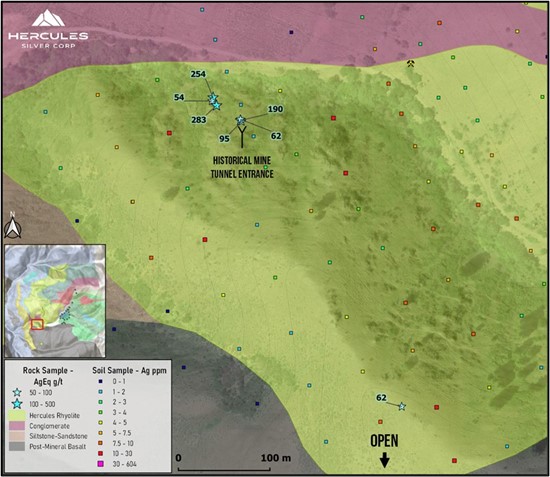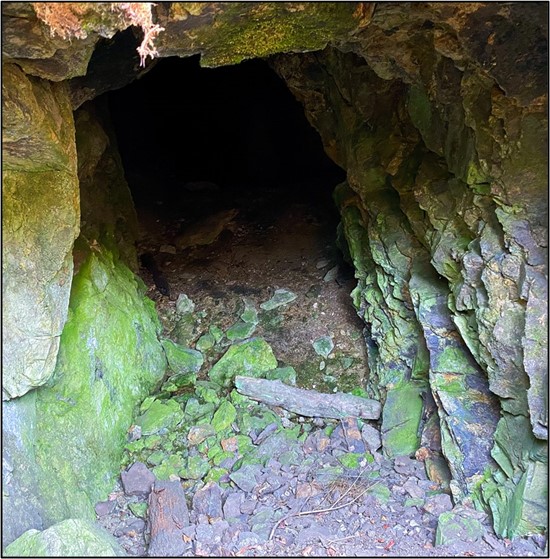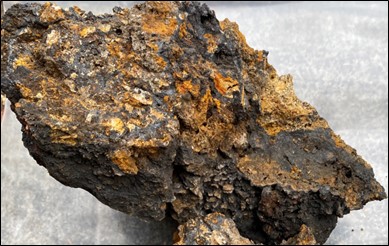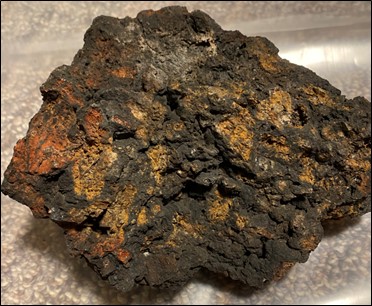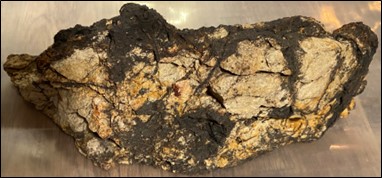Hercules Strengthens New Porphyry Copper/Skarn Target with Gold Grades up to 4.5 g/t and Uncovers New Silver Zone
- Select rock chip samples previously reported were fire assayed for gold, returning grades consistent with a porphyry copper/skarn system at the Metheny, Lightning Breccia and Big Cut Zones1
- Supports the thesis of a potential buried porphyry copper (+/- gold) intrusion on the east side of Property, with further evidence including:
- Widespread phyllic and argillic alteration, typically found above a porphyry intrusion, with distal propylitic alteration to the east
- Volcanics and limestones exposed at surface, suggesting the porphyry intrusion lies at depth
- High-grade skarns grading up to 21% copper, 4.5 g/t gold and 1,085 g/t silver (skarn occurs when limestone is altered and mineralized by a nearby porphyry copper intrusion)
- Large hydrothermal breccia pipe (the Lightning Breccia)
- Textbook metal zonation, with a high temperature core of copper-gold (bismuth-tellurium) overlain by silver-lead-zinc (manganese-arsenic-antimony-mercury) in the younger Hercules Rhyolite to the west
- Historical mining tunnel re-discovered at the new South Camp Creek Zone, indicating a potentially significant extension to the CRD-style silver system beyond the 3.5 kilometers of known strike length
Click below for a summary of today’s news from CEO Chris Paul.
To view an enhanced version of this graphic, please visit:
https://images.newsfilecorp.com/files/9425/163640_0e4ef8e0b43e5bac_002full.jpg
Toronto, Ontario–(Newsfile Corp. – April 25, 2023) – Hercules Silver Corp. (TSXV: BIG) (OTCQB: BADEF) (FSE: 8Q7) (“Hercules Silver” or the “Company“) is pleased to announce new gold geochemical results from mineralized skarns and breccias at the Metheny, Big Cut and Lightning Breccia Zones on the Hercules Property located in western Idaho (“Hercules” or the “Property”). On January 24, the Company announced 4-acid assay results for silver, lead, zinc and copper from over 800 rock chip samples within soil anomalies across the Property. A 4-acid digest provides superior analytical results versus a typical aqua regia digest, due to the complete digestion of the sample, however gold values are not reported. The Company subsequently fire assayed select rock samples within the porphyry copper target area, which revealed the presence of gold in bedrock. The gold is associated with mineralized skarns as well as a breccia pipe, both of which are interpreted to be the near-surface expression of a buried porphyry copper target. The new gold-in-rock values are shown along with associated gold-in-soil values in Figure 1.
Figure 1: Gold Grades in Soil and Rock Chip Samples
To view an enhanced version of this graphic, please visit:
https://images.newsfilecorp.com/files/9425/163640_figure_1.jpg
Higher Grade Potential at Depth
Surface data suggests that the source intrusion responsible for the copper-gold mineralization at surface lies deeper in the system. The geology at surface is typical of the upper levels of a porphyry copper deposit, including phyllic and argillic alteration associated with the copper-gold anomaly, and widespread propylitic alteration outboard of that to the east. This is classic zonation around and above a porphyry copper system, where the higher-grade potassic alteration occurs at depth, below the phyllic and argillic cap.
In the CRD deposit model, the silver-lead-zinc grades increase towards the edge of the porphyry copper intrusion. As a result, the Company may expect to find higher silver-lead-zinc grades at depth, as the rhyolite approaches the buried porphyry copper intrusion (also inferred to lie at depth). This is supported by the presence of a large IP chargeability anomaly at depth in the rhyolite – refer to Hercules Silver’s press release dated December 15, 2022, for additional information. Chargeability is a geophysical technique aimed at measuring the concentration of sulfide mineralization in the ground. The higher chargeability values at depth within the rhyolite suggests an increase in sulfide concentration, which in turn lends itself to potentially increased grades at depth.
Metheny and Big Cut Copper Skarn Zones
Two high-grade copper-silver targets, the Big Cut and Metheny Zones, occur within the Triassic Seven Devils Group on the east side of the Property. Both targets demonstrate skarn-style mineralization which occurs where limestone comes in contact with, or lies within close proximity to, a nearby porphyry intrusion. The Big Cut Zone is classified as a garnet-epidote skarn, whereas the Metheny is a specularite (iron) skarn. The differing alteration is likely a function of zonation around a potential porphyry intrusion or multiple intrusive centers at depth.
Historical trenching at the Big Cut prospect, discussed in unpublished reports obtained by Hercules Silver2,3, yielded grades of up to 1.78% copper across 90 feet (~27 meters) and 1.3% copper across 57 feet (~17 meters). Silver was only selectively assayed at the time and gold was not assayed. Other notable historical trench intercepts at the Big Cut are presented in Table 1 below:
Table 1 – Select Historical Trench Results – Big Cut
| Length (ft.) | Length (m) | Cu (%) | Ag (oz/t) |
| 40 | 12.2 | 1.58 | NR |
| 180 | 54.9 | 0.94 | NR |
| 40 | 12.2 | 0.91 | NR |
| 60 | 18.3 | 0.91 | NR |
| 115 | 35.1 | 0.93 | NR |
| 7 | 2.1 | 2.68 | 0.98 |
| 60 | 18.3 | 0.83 | NR |
| 70 | 21.3 | 0.63 | NR |
NR = Not Reported
The assay results reported above are historical in nature and have not been verified by a Qualified Person; therefore, they should not be unduly relied upon.
Historical Mine Tunnel Re-Discovered in New South Camp Creek Zone
Eight new rock chip samples were collected from a new zone, named the South Camp Creek Zone, at the southern-most exposure of the Hercules Rhyolite, where it meets post-mineral cover to the south. The zone was found while prospecting above the faint remains of an old mining camp on Camp Creek Road, which resulted in the re-discovery of a historical, turn-of-the-century era mining tunnel (“adit”). The adit, although partially caved in, is the only known mine working that remains open today, albeit unsafe for current prospecting. It trends south underneath a blanket of younger post-mineral volcanic rock (“basalt”) which conceals the southern extension of the Hercules Rhyolite. The historical mine working is evidence that silver-lead-zinc mineralization remains open to the south underneath the basalt.
At least 3.5 kilometers of silver-lead-zinc mineralization has been exposed at surface from the Belmont Zone in the south to the Grade Creek Zone in the north. The old mine workings in South Camp Creek, as well as two other erosional windows within the basalt, are evidence that silver mineralization continues for at least another 2 kilometers to the south, bringing the total strike length of the CRD system to at least 5.5 kilometers. Samples collected from around the mine workings graded up to 283 g/t AgEq (Figure 2). Additional rock chip sampling and IP geophysics are being planned for this new zone to continue developing additional high-priority drill targets, and to extend the system even further south.
Figure 2: South Camp Creek Zone Showing Ag-in-soil and AgEq in New Rock Chip Sample Results
To view an enhanced version of this graphic, please visit:
https://images.newsfilecorp.com/files/9425/163640_figure_2.jpg
Photo 1: Historical Adit in South Camp Creek Zone; Only Remaining Open Tunnel on the Property
To view an enhanced version of this graphic, please visit:
https://images.newsfilecorp.com/files/9425/163640_photo_1.jpg
Photo 2: Sample Adit-07 Grading 283 g/t AgEq (217 g/t Ag, 1.6% Pb, 0.41% Zn, >10% Mn)
To view an enhanced version of this graphic, please visit:
https://www.miningstockeducation.com/wp-content/uploads/2023/04/163640_photo_2.jpg
Photo 3: Sample Adit-05 Grading 253 g/t AgEq (180 g/t Ag, 1.5% Pb, 0.67% Zn, >10% Mn)
To view an enhanced version of this graphic, please visit:
https://www.miningstockeducation.com/wp-content/uploads/2023/04/163640_photo_3.jpg
Photo 4: Sample Adit-01 Grading 189 g/t AgEq (41 g/t Ag, 4.83% Pb, 0.23% Zn, 6% Mn)
To view an enhanced version of this graphic, please visit:
https://www.miningstockeducation.com/wp-content/uploads/2023/04/163640_photo_4.jpg
Sample Analysis and QAQC
All rock samples were prepped and analyzed at MSA Labs in Langley, British Columbia, an ISO 17025 and ISO 9001 certified laboratory. Samples were dried and crushed to 2mm, from which a 250g sub-sample split was then pulverized to 85% passing a 75-micron sieve. Following preparation, 232 of the 807 previously reported rock assays were analyzed for gold by a 50g fire assay with AAS finish (FAS-221 method), and 8 new rock assays from the South Camp Creek Zone were determined by a 4-acid digest (IMS-230 method).
For FAS-221, the sample pulp was mixed with a combination of chemical reagents. The mixture was then heated at high temperature resulting in the formation of a gold-silver bearing lead button and slag. The lead button which contains the gold and silver was cupelled at high temperature. The lead was absorbed by the cupel and left behind a bead which contained the gold and silver content of the sample. The gold-silver bead was acid digested and analyzed by instrumental or gravimetric method.
The fire assays were run on sample pulps held in storage by the lab, following a previous 4-acid analysis reported on January 24, in which the Company provided blind quality control standards. The Company did not ship new blind quality control standards for the fire assay sample sequence, and it should be cautioned that only MSA Labs internal quality control standards, duplicates and blank samples were utilized in the fire assay re-runs. MSA Labs employs internal quality control comprising commercial certified reference materials (CRM), duplicates and blank samples at set frequencies. All reported blanks were less than detection for gold. All of the CRMs were within the between-lab ± two standard deviations of the recommended value. Duplicate precision was also acceptable.
For IMS-230, a 0.25g aliquot of the prepared pulp was digested in a 4-acid solution consisting of hydrochloric, nitric, perchloric and hydrofluoric acids. 4-acid is a near total digest and only the most highly resistant minerals are not dissolved. The resulting solution was analyzed via ICP-MS and ICP-ES for 48 elements and was corrected for inter-element spectral interferences. Mercury was not reported due to volatilization in reaction with hydrofluoric acid and gold was not reported due to the small, 0.25g aliquot size being insufficient to overcome the nugget effect.
Due to the small batch size of 8 rock samples analyzed by IMS-230, blind quality control standards were not inserted into the IMS-230 sample sequence, and it should be cautioned that only MSA Labs internal quality control standards, duplicates and blank samples were utilized for the IMS-230 samples. The CRM for silver was at the ±2SD control limit, but well within control limits for lead, zinc and manganese. Duplicates and blanks showed passing values.
Qualified Person
The scientific and technical information in this news release has been reviewed and approved for disclosure by Donald E. Cameron, MSc, a Registered Member of the Society for Mining, Metallurgy and Exploration, Inc., a QP Member of the Mining & Metallurgical Society of America, and an independent “Qualified Person” for Hercules Silver within the meaning of National Instrument 43-101 – Standards of Disclosure for Mineral Projects (“NI 43-101”). To the best of his knowledge, the technical information pertaining to the Hercules Silver Property, and discussion of it as disclosed in this news release, is neither inaccurate nor misleading.
About Hercules Silver Corp.
Hercules Silver Corp. is a junior mining company focused on the exploration and development of the 100% owned Hercules Silver Project, northwest of Cambridge, Idaho.
The Hercules project is a disseminated silver-lead-zinc system with 28,000 meters of historical drilling across 3.5 kilometers of strike. The Company is well positioned for growth through the drill bit in 2023, having completed extensive surface exploration in 2022 consisting of soil & rock sampling, geological mapping, IP geophysics, and a 9-hole drill program.
The Company’s management team brings significant exploration experience through the discovery and development of numerous precious metals projects worldwide.
For further information please contact:
Chris Paul
CEO & Director
Telephone +1 (604) 449-6819
Email: [email protected]
This news release does not constitute an offer to sell or a solicitation of an offer to buy any of the securities in the United States. Any securities referred to herein have not and will not be registered under the United States Securities Act of 1933, as amended (the “U.S. Securities Act“) or any state securities laws and may not be offered or sold within the United States or to U.S. Persons unless registered under the U.S. Securities Act and applicable state securities laws of an exemption from such registration is available.
Disclaimer for Forward-Looking Information
This news release contains certain information that may be deemed “forward-looking information” with respect to the Company within the meaning of applicable securities laws. Such forward-looking information involves known and unknown risks, uncertainties and other factors that may cause the Company’s actual results, performance or achievements, or developments in the industry to differ materially from the anticipated results, performance or achievements expressed or implied by such forward-looking information. Forward-looking information includes statements that are not historical facts and are generally, but not always, identified by the words “expects,” “plans,” “anticipates,” “believes,” “intends,” “estimates,” “projects,” “potential” and similar expressions, or that events or conditions “will,” “would,” “may,” “could” or “should” occur.
Although the Company believes the forward-looking information contained in this news release is reasonable based on information available on the date hereof, by its nature, forward-looking information involves assumptions and known and unknown risks, uncertainties and other factors which may cause our actual results, level of activity, performance or achievements, or other future events, to be materially different from any future results, performance or achievements expressed or implied by such forward-looking information.
Examples of such assumptions, risks and uncertainties include, without limitation, assumptions, risks and uncertainties associated with general economic conditions; the Covid-19 pandemic; adverse industry events; the receipt of required regulatory approvals and the timing of such approvals; that the Company maintains good relationships with the communities in which it operates or proposes to operate, future legislative and regulatory developments in the mining sector; the Company’s ability to access sufficient capital from internal and external sources, and/or inability to access sufficient capital on favorable terms; mining industry and markets in Canada and generally; the ability of the Company to implement its business strategies; competition; the risk that any of the assumptions prove not to be valid or reliable, which could result in delays, or cessation in planned work, risks associated with the interpretation of data, the geology, grade and continuity of mineral deposits, the possibility that results will not be consistent with the Company’s expectations, as well as other assumptions risks and uncertainties applicable to mineral exploration and development activities and to the Company, including as set forth in the Company’s public disclosure documents filed on the SEDAR website at www.sedar.com.
THE FORWARD-LOOKING INFORMATION CONTAINED IN THIS PRESS RELEASE REPRESENTS THE EXPECTATIONS OF HERCULES SILVER AS OF THE DATE OF THIS PRESS RELEASE AND, ACCORDINGLY, IS SUBJECT TO CHANGE AFTER SUCH DATE. READERS SHOULD NOT PLACE UNDUE IMPORTANCE ON FORWARD-LOOKING INFORMATION AND SHOULD NOT RELY UPON THIS INFORMATION AS OF ANY OTHER DATE. WHILE HERCULES SILVER MAY ELECT TO, IT DOES NOT UNDERTAKE TO UPDATE THIS INFORMATION AT ANY PARTICULAR TIME EXCEPT AS REQUIRED IN ACCORDANCE WITH APPLICABLE LAWS.
Neither the TSX Venture Exchange nor its Regulation Services Provider (as that term is defined in the policies of the TSX Venture Exchange) accepts responsibility for the adequacy or accuracy of this press release.
1 The reader is cautioned that rock chip samples are selective by nature and may not represent the true grade or style of mineralization across the Property.
2 Kelly, S. 1973. Progress Report to the Vancouver Stock Exchange on the Iron Cap, or Big Cut Holdings of Acaplomo Mining and Development Co. Ltd. in the Heath Mining District with concurrence by C.M. Armstrong, P.Eng.
3 Armstrong, C. 1976. Report on the Iron Cap Property, Heath Mining District.

To view the source version of this press release, please visit https://www.newsfilecorp.com/release/163640


